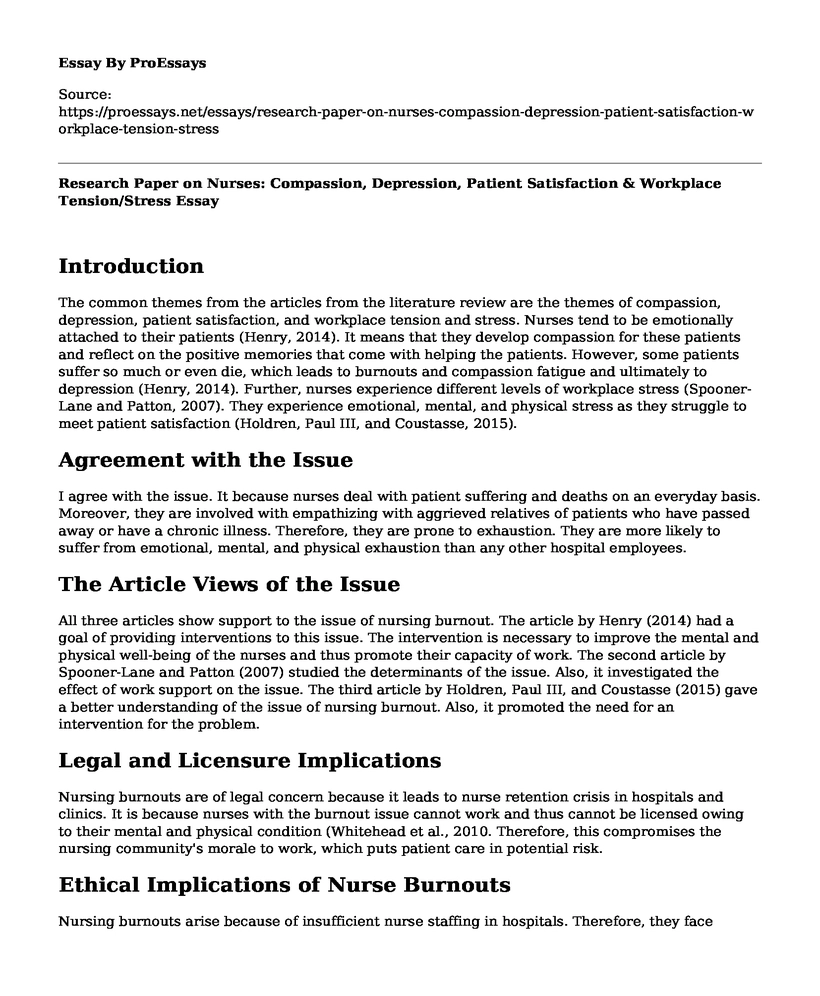Introduction
The common themes from the articles from the literature review are the themes of compassion, depression, patient satisfaction, and workplace tension and stress. Nurses tend to be emotionally attached to their patients (Henry, 2014). It means that they develop compassion for these patients and reflect on the positive memories that come with helping the patients. However, some patients suffer so much or even die, which leads to burnouts and compassion fatigue and ultimately to depression (Henry, 2014). Further, nurses experience different levels of workplace stress (Spooner-Lane and Patton, 2007). They experience emotional, mental, and physical stress as they struggle to meet patient satisfaction (Holdren, Paul III, and Coustasse, 2015).
Agreement with the Issue
I agree with the issue. It because nurses deal with patient suffering and deaths on an everyday basis. Moreover, they are involved with empathizing with aggrieved relatives of patients who have passed away or have a chronic illness. Therefore, they are prone to exhaustion. They are more likely to suffer from emotional, mental, and physical exhaustion than any other hospital employees.
The Article Views of the Issue
All three articles show support to the issue of nursing burnout. The article by Henry (2014) had a goal of providing interventions to this issue. The intervention is necessary to improve the mental and physical well-being of the nurses and thus promote their capacity of work. The second article by Spooner-Lane and Patton (2007) studied the determinants of the issue. Also, it investigated the effect of work support on the issue. The third article by Holdren, Paul III, and Coustasse (2015) gave a better understanding of the issue of nursing burnout. Also, it promoted the need for an intervention for the problem.
Legal and Licensure Implications
Nursing burnouts are of legal concern because it leads to nurse retention crisis in hospitals and clinics. It is because nurses with the burnout issue cannot work and thus cannot be licensed owing to their mental and physical condition (Whitehead et al., 2010. Therefore, this compromises the nursing community's morale to work, which puts patient care in potential risk.
Ethical Implications of Nurse Burnouts
Nursing burnouts arise because of insufficient nurse staffing in hospitals. Therefore, they face emotional and physical distress and job dissatisfaction, which makes it difficult for them to perform their duties within the confinements of their work ethics (Whitehead et al., 2010). The distress puts the nurses in an ethical dilemma where they have to choose between caring for the patient's welfare and their welfare. Thus, they end up not meeting the proper patient care standard.
The Relationship between Nurse Burnouts and Overall Healthcare Delivery
Nurse burnouts affect healthcare delivery systems negatively. When the patients expect quality healthcare from hospitals, the nurses fail to meet their expectations because of understaffing and increased patient to nurse ratio in the hospitals (Aiken et al., 2002). Thus, the available nurses provide poor patient care, have decreased job satisfaction, and experience physical and emotional distress. Moreover, nurse burnout may lead to legal issues between the healthcare system and the public.
How Nurse Burnouts Affects Healthcare
Nurse burnouts have negative impacts on healthcare. They increase the cost of healthcare because nurses who suffer from exhaustion cannot ensure patient safety (Aiken et al., 2002). Therefore, the rate of iatrogenic injury increases, and so does the incurred costs to correct it. Also, nurse burnout lead decreased access to healthcare services. Understaffing of nurses in hospitals means that one nurse has to take care of more patients than the standard requirement. Thus the reduced patient care services. Lastly, nurse burnout leads to decreased nursing resources as more nurses get mental conditions that do not allow them to provide nursing services.
How Nurse Burnouts Affects Patient Care
Nurse burnouts lead to poor patient care. A nurse who is mentally, physically, and emotionally exhausted cannot meet the obligations of his work. They cannot protect the patient from harm because they have to care for more patients who surpass their abilities.
References
Aiken, L. H., Clarke, S. P., Sloane, D. M., Sochalski, J., & Silber, J. H. (2002). Hospital nurse staffing and patient mortality, nurse burnout, and job dissatisfaction. Jama, 288(16), 1987-1993.
Henry, B. J. (2014). Nursing Burnout Interventions. Clinical Journal of Oncology Nursing, 18(2).
Holdren, P., Paul III, D. P., & Coustasse, A. (2015). Burnout syndrome in hospital nurses.
Spooner-Lane, R., & Patton, W. (2007). Determinants of burnout among public hospital nurses. Australian Journal of Advanced Nursing, 25(1), 8.
Whitehead, D. K., Weiss, S. A., & Tappen, R. M. (2010). Essentials of nursing leadership and management. FA Davis.
Cite this page
Research Paper on Nurses: Compassion, Depression, Patient Satisfaction & Workplace Tension/Stress. (2023, Jan 20). Retrieved from https://proessays.net/essays/research-paper-on-nurses-compassion-depression-patient-satisfaction-workplace-tension-stress
If you are the original author of this essay and no longer wish to have it published on the ProEssays website, please click below to request its removal:
- Health Programs Towards Preventing Low Birth Weights. Essay Example on Public Health.
- Employee Motivation and Accountability: A Case Study of Infosys Limited
- Essay Sample on Deviance and Social Norm
- What Is the Right Thing to Do for Living a Healthy Lifestyle Paper Example
- Essay Sample on Mid-Life Crisis
- Essay Example on COVID-19: Essential Rules of Survival in a Global Crisis
- Nutrition Plan for Athletic Male: Liam Case Study







